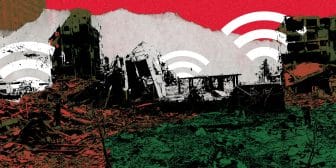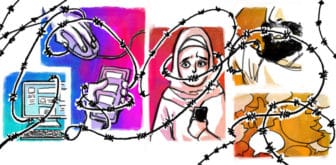
Bridging Digital Divides
Technology’s benefits often go most directly to those with the greatest access to privilege and wealth, while its harms are largely inflicted on those already facing discrimination, marginalization, and injustice. Bridging digital divides and achieving racial, social, gender, and environmental justice is fundamental for defending human rights in the digital age.

Why internet shutdowns are even worse for women
We all know internet shutdowns violate human rights and destroy people’s lives and livelihoods. For women around the world, they also take away crucial opportunities and exacerbate the inequality and injustice they already suffer.
Related Issues
Latest Updates

How to stay safe online during the 2024 Bangladesh election
The 2024 Bangladesh election takes place on 7 January. Against a backdrop of myriad threats to digital freedoms and human rights online, we’re created a guide to help journalists, activists, and voters stay safe during the election period.

Palestinians are locked out of Google’s online economy

الفصل العنصري الرقمي واستخدام خوارزميات التواصل الاجتماعي في الأزمات الإنسانية

Cómo protegerse en línea en el contexto del conflicto en Gaza
La presente guía de consejos sobre resiliencia digital elaborada por Access Now y SMEX fue diseñada para brindarles apoyo contra las amenazas denunciadas.

Staying safe online in the context of conflict in Gaza
This digital resilience tipsheet compiled by Access Now and SMEX is designed to support you in defending against reported threats.

دعوة مفتوحة من منظمات حقوق الإنسان لوقف فوري لإطلاق النار على الأرض ورقمياً في غزة، وبحق الفلسطينيين/ات حول العالم
نحن، مجموعة من مؤسسات المجتمع المدني ومنظمات حقوق الإنسان الرقمية، ننضم إلى الدعوة المفتوحة للوقف الفوري لإطلاق النار في غزة.

Joint Statement: Internet Governance Forum must reverse decision to make Saudi Arabia its next host
An IGF 2024 hosted by Saudi Arabia is incompatible with the event’s multistakeholder model, as human rights risks make robust civil society engagement impossible.

The digital identity toolkit
Developed by Access Now, this toolkit helps build the lexicon and framework around digital ID issues to facilitate a human rights approach.

We’re headed to South Korea: the when, where, and why of our next convening
We’re excited to announce that the 13th edition of the RightsCon Summit Series will be held in South Korea and online in February 2025!

An open letter to the RightsCon community about RightsCon Costa Rica and what comes next
We explain the challenges and exclusion some participants faced, apologize and take accountability for our role, and share thoughts on the road ahead.

Joint Statement: Passport and visa systems must not exclude members of the human rights community from cross-border convenings
These discriminatory systems prevent human rights defenders from coming together to advance their work, bring severe hardship and harm to those impacted, and unjustly place the heaviest burden on people from the Global Majority. Join us in taking a stand.

Tech and conflict: a guide for responsible business conduct
This guide is meant to help tech companies think through the impacts of their decisions in the context of conflict.

Resurging internet shutdowns in 2022: weapons of control, shields of impunity

U.S. President Biden signs into law $65 billion for more accessible and affordable internet
Today, President Biden signed the bipartisan infrastructure bill into law, which includes $65 billion to close the digital divide.

Civil society defends affordable broadband in New York
Access Now and a coalition of civil society organizations filed an amicus brief in support of New York’s Affordable Broadband Act (ABA).
